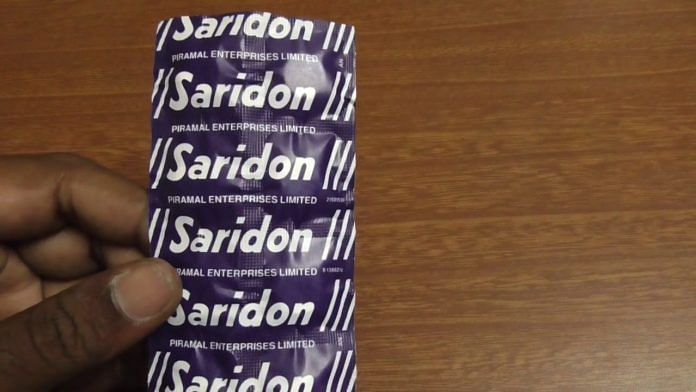For over 4 decades, Saridon has been a one-pop solution to all headaches. After a brief ban, it’s back on the counter.
New Delhi: If all the Saridon sold in India in 2002-2003 is arranged one on top of the other, read a report by Superbrands – a global publishing house on branding – “they would form a pile 14 times higher than Mount Everest”.
“Several studies for this brand (Saridon) have thrown up the unprecedented figure of 100 per cent awareness in unaided recall. Saridon is sold across the counter – even in a place where the closest telephone booth is seven kilometres away,” the report said.
If anything, the report only reaffirmed the reputation that the drug Saridon had acquired in India – as the one-pop solution to all headaches, and all sorts of body pain.
Also read: Banning 328 ‘cocktail’ drugs not a witch hunt, says officer behind the crackdown
The brand hogs 85 per cent market share in the fixed-dose combination category (FDC) of drugs. Its sales for a year ending March 2018 stood at 2.7 crore units, at a revenue of Rs 51.5 crore, according to the research firm, AIOCD AWACS data.
Saridon’s makers had assiduously built the brand image on the back of an array of advertisements, etching the jingle ‘Sirf ek Saridon aur sar dard se aaram, na rahe pida na rahe dard, bas ek sirf ek sirf ek Saridon (Get relief from your headache with just one Saridon, there is no agony or pain with just one, and only one Saridon) ’ firmly on consumer minds.
And just when it seemed that the lights would go out on the drug’s over four-decade association with India, it has got a reprieve. On Monday, the Supreme Court allowed the sale of Saridon after the drug’s parent company, Piramal Healthcare, challenged the government’s decision to ban Saridon, along with 327 other combination drugs, on the ground that they were ‘risky’ for patients.
The Swiss painkiller
Saridon was launched in 1933 by Hoffmann La Roche, a Swiss multinational healthcare company popularly known as ‘Roche’. Since then, however, it has undergone several formulation changes.
In its earliest formulation, it contained phenacetin as its active ingredient. This was later replaced by acetaminophen, a proven safe drug.
In 1969, almost four decades after it was launched, Roche brought Saridon to India and continued to manufacture it until 1993 when, under a license agreement, the brand was transferred to Nicholas Piramal, now known as Piramal Enterprises Limited.
Piramal entered the self-care business with Saridon.
Also read: Blockchain coming to India’s aid in war on fake drugs
Why was Saridon banned?
Saridon was banned due to the usage of three formulations in one pill that is also called a fixed-dose combination. It includes paracetamol, propyphenazone and caffeine.
While paracetamol is one of the key ingredients to relieve pain and fever, propyphenazone also alleviates inflammation apart from the pain and fever. Caffeine is a natural substance, which is extracted from coffee beans, tea leaves and cocoa. It stimulates the brain and has analgesic properties.
While the company claims that the combination of these active ingredients is highly effective and provides quick relief from pain, the drugs technical advisory board, constituted under the Ministry of Health and Family Welfare, declared it as an ‘irrational’ combination and ‘risky’ for patients.
Last week, the government had banned the manufacture, sale or distribution of as many as 328 varieties of combination drugs including Saridon.
Why has it been pulled out of the banned list?
The apex court had on 7 September clarified that the government can carry out a fresh inquiry into the safety of 15 drugs that were approved for sale before 1988. Saridon falls in this category, as it was also approved by the Drug Controller General of India (DCGI) and licensed prior to September 1988.
The 15 FDCs included several leading brands such as popular cough syrup Phensedyl that had a market share of Rs 340 crore as of July 2018, and Tossex and Tixylix, which generate around Rs 60 crore each in sales.
“It (Saridon) is one of the oldest painkillers and most trusted brand of medicines in the country. By now, we are almost sure that it has no major side effects,” said K.K. Aggarwal, former president of Indian Medical Association. “However, I still ask my patients to avoid the pill if they can”.




Very informative read, indeed!
I thought Saridom™’s celebrity was only limited to the ‘catchy-ness’ of its jingle (????सिर्फ़ एक Saridon™, और सर दर्द से आराम — सिर्फ़ एक, Saridon™????) but my, my.. Didn’t knew it was such a contender to Parle® G®.°
*Saridon is a registered trademark of Bayer Consumer Care, exclusively-licensed to Piramal Enterprises for the territories of India.